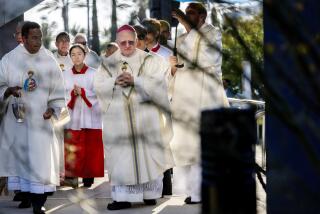U.S. Bishops Asked to Review Controversial Policy Paper on AIDS
- Share via
The president of U.S. Roman Catholic bishops Tuesday urged a review by the entire American hierarchy in June of a controversial church paper on AIDS in order to “formulate a clear . . . policy” on the church response to the disease.
The policy paper, drafted by the 50-bishop U.S. Catholic Conference administrative board, drew strong objections from many bishops not on the board who felt the language was confusing, and some refused to implement it in their dioceses. The document broke church precedent by permitting a limited discussion by Catholic officials of condoms as a public health deterrent to the disease.
Difficult Decision
The turnaround marks a difficult decision for Archbishop John L. May of St. Louis, president of the U.S. bishops, who had stood by the document in the first days after its Dec. 10 release.
His statement Tuesday appeared to be aimed at mollifying both conservative bishops upset by the document’s section on condoms and liberal bishops who welcomed the wide-ranging statement as a compassionate approach to moral dilemmas posed by acquired immune deficiency syndrome.
May said he would suggest to the administrative board in March that the more than 300 bishops review the document at their next regular meeting June 24-27 in Collegeville, Minn.
“The primary purpose of any such discussion would be to allow all the bishops to formulate clear conference policy on aspects of the AIDS issue to whatever extent this is deemed necessary,” May said in a statement.
At the same time, May added, “the statement of the administrative board stands and is neither being withdrawn nor temporarily set aside.”
Two influential American cardinals had taken opposing views of the issue: Cardinal Joseph Bernardin of Chicago, one of the paper’s authors and a liberal on some issues, welcomed the document as “faithful” to Catholic doctrine and “sensitive to the human dimensions.” But conservative Cardinal John O’Connor of New York, who is not on the administrative board, termed the paper a “grave mistake” and said he would not use it.
A third approach was taken in Los Angeles by Archbishop Roger M. Mahony. Last week Mahony adopted the 30-page document, “The Many Faces of AIDS: A Gospel Response,” as archdiocesan policy after changing five sentences he said were confusing.
Echoing widespread concern about the original language, Mahony said that some Catholics would be misled into thinking that the church was now endorsing prophylactics.
Nevertheless, the Los Angeles archdiocese’s version still acknowledges that public education efforts against AIDS contain the public health recommendations that condoms should be used by sexually active people at risk of catching or spreading the disease. Mahony’s language made it clearer that Catholics participating in public education efforts should emphasize the church’s stance that no sex outside marriage between a man and a woman is safe or moral.
The document, as revised, also said that “Catholic health care facilities should take care that a proper moral analysis of recommendations by public health officials . . . is an essential component of their AIDS education programs.”
Section Left Unchanged
Mahony left unchanged a section of the bishops’ paper that “the situation is somewhat different” in doctor-patient relationships or in educational programs for people who have already been exposed to the disease.
The document said the teaching of classical theologians, cited in footnotes, could apply, namely recommending “the lesser of two evils.” Although the bishops’ AIDS paper does not illustrate the case, analysts say a typical situation would be when an infected person being counseled refuses to swear off sex, then that person might be legitimately urged to use condoms to prevent the greater evil--the infection of others.
O’Connor and, recently, Archbishop J. Francis Stafford of Denver have objected to the paper’s application of the “lesser of two evils” idea attributed to St. Thomas Aquinas.
“The principle as articulated by Aquinas permits toleration of social evil by civil authority,” Stafford said, “but not toleration, and still less real or tacit cooperation in its transmissions, by the bishops and the church community.”
Stafford, declining to implement the policy paper in Denver, also questioned the authority of the U.S. Catholic Conference’s administrative board to issue a binding document.
A bishops’ spokesman said earlier that the AIDS paper was not submitted to the U.S. bishops’ full meeting in November because the final draft was not ready for distribution by the required month before the meeting. Because of the urgency of the AIDS crisis, the administrative board decided to issue it for church guidance, as it has with many other--but less controversial--position papers.
May said Tuesday that he suggested in “a private letter” to the bishops dated Dec. 17 that at the June meeting “the administrative board’s statement needs to be addressed in greater depth by the membership. We might all benefit from a complete review of the matter.”
May also suggested “a full discussion of certain principles of moral theology and their specific application to the AIDS epidemic in this country.”
The first indication that the AIDS paper would be reviewed came Monday when Cardinal O’Connor revealed parts of May’s Dec. 17 letter.
Bishops Norman F. McFarland of the Orange Diocese and Leo T. Maher of the San Diego Diocese were among bishops who decried the language of the document.
More to Read
Sign up for Essential California
The most important California stories and recommendations in your inbox every morning.
You may occasionally receive promotional content from the Los Angeles Times.










